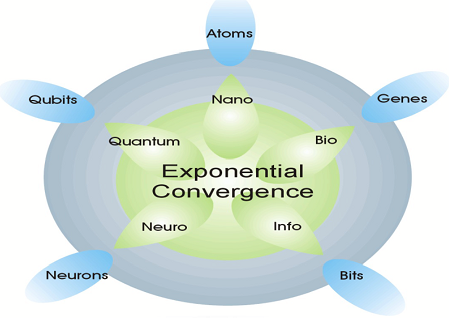One of the people in this MadSci post, Dr. James Giordano, can be downright scary regarding the scope, direction and implications of his research.
From the Army's Mad Scientist blog, June 15, 2023, Podcast and notes:
449. One Brain Chip, Please! Neuro-AI with two of the Maddest Scientists
“What are the implications when you have your own customized, autonomous network of smart brains?”
[Editor’s Note: Mad Scientist is an Army initiative and Community of Action that continually explores the Operational Environment and the changing character of warfare. We connect the intellect of the Nation to the Army and serve as an on-ramp for academia, industry, and other parts of the Government to share their ideas and innovations. Our latest episode of The Convergence podcast features “rock star” proclaimed Mad Scientists — Dr. James Giordano and Dr. James Canton — discussing the convergence of neuroscience and artificial intelligence, its impact on future warfare, and where the U.S. falls short in technology development, relative to our competitors and adversaries — Enjoy!]
Proclaimed Mad Scientist Dr. James Giordano is Pellegrino Center Professor in the Departments of Neurology and Biochemistry; Chief of the Neuroethics Studies Program; and Chair of the Subprogram in Military Medical Ethics at Georgetown University Medical Center, Washington DC. Dr. Giordano is a Bioethicist of the Defense Medical Ethics Center at the Uniformed Services University of Health Sciences; Distinguished Stockdale Fellow in Science, Technology, and Ethics at the United States Naval Academy; Senior Fellow in Biosecurity, Technology, and Ethics at the U.S. Naval War College, Newport, RI; Senior Science Advisory Fellow of the Strategic Multilayer Assessment (SMA), Joint Staff / J-39, The Pentagon; Chair Emeritus of the Neuroethics Project of the Institute of Electrical and Electronics Engineers (IEEE) Brain Initiative; and serves as Director of the Institute for Biodefense Research, a federally funded Washington, DC think tank dedicated to addressing emerging issues at the intersection of science, technology and national defense. He previously served as Donovan Group Senior Fellow, U.S. Special Operations Command; member of the Neuroethics, Legal, and Social Issues Advisory Panel of the Defense Advanced Research Projects Agency (DARPA); and Task Leader of the Working Group on Dual-Use of the EU-Human Brain Project.
Dr. Giordano is the author of 340 peer-reviewed publications, 7 books and 45 governmental reports on science, technology, and biosecurity, and is an elected member of the European Academy of Science and Arts, a Fellow of the Royal Society of Medicine (UK), and a Fulbright Professorial Fellow. A former U.S. Naval officer, he held designations as an aerospace physiologist and research psychologist, and served with the U.S. Navy and Marine Corps.
Proclaimed Mad Scientist Dr. James Canton is a global futurist, social scientist, author, and strategic advisor. As a former Apple Computer executive and high tech entrepreneur, he has been insightfully forecasting the key trends and technologies that have shaped our world, including AI-nano-bio-IT-neuroquantum-
cloud. The Economist recognizes him as one of the leading global futurists. He has advised three White House Administrations, the DoD, Intelligence Community, and over 100 companies over 30 years. Dr. Canton is CEO and Chairman of the Institute for Global Futures, a leading think tank he founded in 1990 that advises business and government.Dr. Canton is the author of Future Smart, The Extreme Future: The Top Trends That Will Reshape the World in the Next Twenty Years, and Technofutures: How Leading-Edge Innovations Will Transform Business in the 21st Century. Dr. Canton has been a lecturer at Stanford University, the Wharton School of the University of Pennsylvania, New York University, the U.S. Army and Naval War Colleges, and the Joint Special Operations University. He has held appointments at Singularity University at NASA, the Kellogg School of Management, MIT’s Media Lab, EU, the Potomac Institute, and served on the International Advisory Council, Singapore Economic Development Board, been an advisor to the National Science and Technology Council, U.S. Departments of State, Defense, and Health and Human Services.
In our latest episode of The Convergence podcast, Army Mad Scientist sits down with our “James Gang” — Dr. James Giordano and Dr. James Canton — to discuss the convergence of neuroscience and artificial intelligence, its impact on future warfare, and where the U.S. falls short in technology development relative to our competitors and adversaries. The following bullet points highlight key insights from our conversation:
The brain sciences are highly dependent on interaction with other sciences and disciplines – social sciences, law, humanities, etc. – as well as ethics and philosophy. We need to understand that an “asymmetry in ethics” exists, where what is prohibited by one society, may be permitted and pursued by others.
You can’t do effective brain science without convergence and breaking down silos. It’s the convergence that enables and force multiplies the brain sciences to be used in national security, intelligence, and defense milieu.
We need to be looking at bolder, moonshot ideas using the AI and Neuro Science communities. The first time these communities came together, during the Synapse project through DARPA, neural nets were created.Opportunities exist outside of instrumenting just humans. Other species could be used as cooperatives or proxies for human engagement, or even non-human entities such as biomimetic drones....
...,MUCH MORE, including pod.
If interested here is a snappy little 15 page paper from PRISM, the Journal of Complex Operations, hosted at the National Defense University:
PRISM 8, NO. 3 FEATURE S | 49
Redefining Neuroweapons
Emerging Capabilities in Neuroscience
and Neurotechnology
And a talk hosted by the Modern War Institute that he gave at West Point:
The Brain is the Battlefield of the Future
